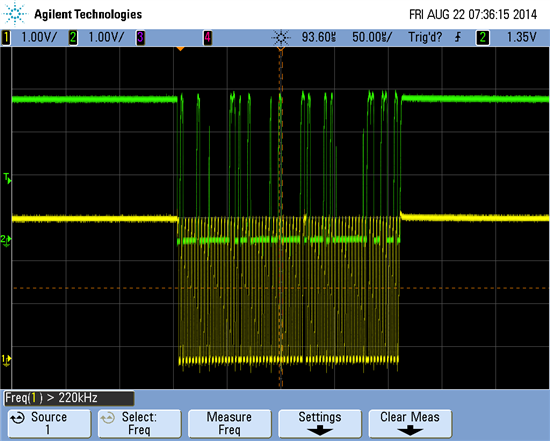I'm having trouble using the I2C interface with the ROM boot loader active. I don't get the reponses I expect.
Code from my I2C master:
#define TIVA_DEVICEADDRESS (0x42<<1)
uint8 status_cmd = COMMAND_GET_STATUS;
uint8 ping_cmd = COMMAND_PING;
void EeSetStart(void)
{
volatile uint16 x;
// Start condition
ACCESS2_CTRL_REG &= ~(EN_ACCESS_BUS);
x++; // 624 ns
ACCESS2_CTRL_REG |= (SCL_VAL | SDA_VAL);
BusyWait1();
ACCESS2_CTRL_REG &= ~(SDA_VAL);
BusyWait1();
ACCESS2_CTRL_REG &= ~(SCL_VAL);
BusyWait1();
}
void EeSetStop(void)
{
// stop condition
ACCESS2_CTRL_REG &= ~(EN_ACCESS_BUS);
ACCESS2_CTRL_REG &= ~(SCL_VAL | SDA_VAL);
BusyWait1();
ACCESS2_CTRL_REG |= SCL_VAL;
BusyWait1();
ACCESS2_CTRL_REG |= SDA_VAL;
BusyWait1();
}
void EeSendByte(BYTE a)
{
volatile WORD n;
ACCESS2_CTRL_REG |= EN_ACCESS_BUS; // automatic control SDA/SCL-VAL
n++; // this is neccesssary to delay following events
ACCESS2_CLEAR_INT_REG = 0;
ACCESS2_IN_OUT_REG=a;
// Wait until transmission is done
while (!(ACCESS2_CTRL_REG & ACCESSx_INT)) ;
ACCESS2_CLEAR_INT_REG = 0;
}
BYTE ReadByte_Ack(UByte nextNoAck)
{
volatile uint16 Read = 0;
ACCESS2_CTRL_REG &= ~ACKn;
while (!(ACCESS2_CTRL_REG & ACCESSx_INT));
Read=ACCESS2_IN_OUT_REG; // Read received byte
ACCESS2_CLEAR_INT_REG = 0;
if (nextNoAck)
{
ACCESS2_CTRL_REG |= ACKn; // don't transmit Acknowledge
}
return(Read);
}
BYTE ReadByte_NoAck(void)
{
volatile uint16 Read = 0;
ACCESS2_CTRL_REG |= ACKn; // don't transmit Acknowledge
while (!(ACCESS2_CTRL_REG & ACCESSx_INT));
Read=ACCESS2_IN_OUT_REG; // Read received byte
ACCESS2_CLEAR_INT_REG = 0;
return(Read);
}
uint8 send_packet(uint8* data, uint8 size)
{
uint8 i, ack, checksum = 0;
for (i = 0; i < size; i++) {
checksum += data[i];
}
do
{
EeSetStop();
EeSetStart();
EeSendByte(TIVA_DEVICEADDRESS);
} while (ACCESS2_CTRL_REG & ACKn);
EeSetStop();
EeSetStart();
EeSendByte(size +2);
EeSendByte(checksum);
for (i = 0; i < size; i++) {
EeSendByte(data[i]);
}
EeSetStart();
// Set Device address for read
EeSendByte(TIVA_DEVICEADDRESS|0x01);
ack = ReadByte_NoAck();
debugf("-%02X-\n", ack);
EeSetStop();
return ack;
}
uint8 get_packet(uint8* data, uint8* size)
{
uint8 i, psize, pchecksum, checksum = 0;
do
{
EeSetStop();
EeSetStart();
EeSendByte(TIVA_DEVICEADDRESS);
} while (ACCESS2_CTRL_REG & ACKn);
EeSetStart();
EeSendByte(TIVA_DEVICEADDRESS|0x01);
psize = ReadByte_Ack(0);
debugf("psize = %02X\n", psize);
if (psize < *size) *size = psize;
pchecksum = ReadByte_Ack(0);
debugf("pchecksum = %02X\n", pchecksum);
for (i = 0; i < *size; i++) {
if (i == (*size-1)) {
data[i] = ReadByte_NoAck();
} else if (i == (*size-2)) {
ReadByte_Ack(1);
} else {
data[i] = ReadByte_Ack(0);
}
}
for (i = 0; i < *size; i++) {
checksum = data[i];
}
EeSetStart();
// Set Device address for write
EeSendByte(TIVA_DEVICEADDRESS);
if (checksum == pchecksum) {
EeSendByte(COMMAND_ACK);
EeSetStop();
return COMMAND_ACK;
} else {
EeSendByte(COMMAND_NAK);
EeSetStop();
return COMMAND_NAK;
}
}
uint8 send_command(uint8* cmd, uint8 size)
{
uint8 ret;
uint8 status, ssize;
ret = send_packet(cmd, size);
ret = send_packet(&status_cmd, 1);
ssize = sizeof(status);
ret = get_packet(&status, &ssize);
debugf("status: %02X\n", status);
return ret;
}
void tiva_main()
{
send_commnad(&ping_cmd, 1);
}
Output from my debug interface:
-c2- <-- expected 0xCC = COMMAND_ACK -c2- <-- expected 0xCC = COMMAND_ACK psize = c2 <-- expected 1 pchecksum = f0 <-- expected 0x40 status: fc <-- expected 0x40 = COMMAND_RET_SUCCESS
Any ideas?






